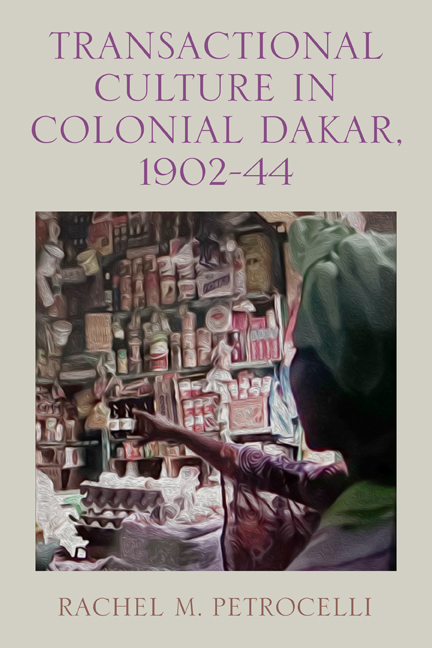Book contents
- Frontmatter
- Dedication
- Contents
- List of Illustrations
- Acknowledgments
- Introduction
- 1 Illusory Roots: Europeans, Autochthony, and Visions of a Capital City
- 2 The Rhetoric of Refoulement in Colonial Dakar
- 3 Challenges and Solutions of the Transient City
- 4 Impediments and Ingenuity in Financial Life
- 5 Ethnic Boundaries, Economic Niches, and Ambiguities in the Colonial City
- 6 The Lebanese and the Local in the Interwar Period
- 7 War’s Window: Urban Informality and Control
- Epilogue
- Bibliography
- Index
2 - The Rhetoric of Refoulement in Colonial Dakar
Published online by Cambridge University Press: 08 May 2024
- Frontmatter
- Dedication
- Contents
- List of Illustrations
- Acknowledgments
- Introduction
- 1 Illusory Roots: Europeans, Autochthony, and Visions of a Capital City
- 2 The Rhetoric of Refoulement in Colonial Dakar
- 3 Challenges and Solutions of the Transient City
- 4 Impediments and Ingenuity in Financial Life
- 5 Ethnic Boundaries, Economic Niches, and Ambiguities in the Colonial City
- 6 The Lebanese and the Local in the Interwar Period
- 7 War’s Window: Urban Informality and Control
- Epilogue
- Bibliography
- Index
Summary
Refoulement in the French Colonial Conception of the City
The two decades from 1914 to 1934 saw increasingly heightened concern in the colonial state's perception of Africans as the principal undesirable element of the capital of France's important West African colony. Administrators adhered to a race-driven concept of urban modernity, one that was threatened by Dakar's growth even as that growth brought the city to greater prominence. State vision was for a grand capital, major Atlantic port, and modern city. This was expressed throughout the years of high colonialism— key decades for the development of Dakar—but was also accompanied by a current of concern among officials that the capital's African setting and social makeup could compromise its potential. As the men who staffed the colonial state attempted to hone their professional approach to urban management, they brought into their work a rhetoric around Africans that was embedded in the language of modernity. Within it, the majority of Africans were cast as inappropriate to city dwelling, making the generation of strategies to discourage them from coming to or remaining in town a vital aspect of running the capital. Part of the project of making Dakar what they believed was modern was dealing not only in the technical details of urban planning but also in the social attributes of the city. Yet, these ideas did not correspond to realities on the ground. Ultimately, the energy and effort devoted to making Dakar a modern European city did little to wrest the day-to-day power to shape urban life from the hands of those who lived it. The way in which this was perhaps most obvious was in the simple fact of Dakar's growth from the 1910s through the 1930s to an African-majority city, a process that stood in deep contrast to the goals and visions of the state.
In France, a reconceptualization of urban space began in the 1850s with Haussmann's transformation of Paris, but it was in the early decades of the twentieth century that its relationship to urban life, human development, and modernity was more explicitly drawn out in circles of urban planners, architects, and sociologists. As colonial administration of FWA congealed, the concept of professionalized rule took shape in Dakar, informed not only by colonial imperatives but by global trends.
- Type
- Chapter
- Information
- Transactional Culture in Colonial Dakar, 1902-44 , pp. 40 - 62Publisher: Boydell & BrewerPrint publication year: 2024

